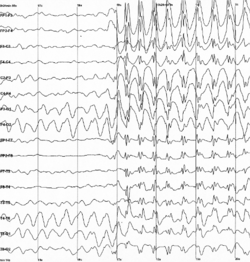Seizure
An epileptic seizure (colloquially a fit) is a brief episode of signs and/or symptoms due to abnormal, excessive, or synchronous neuronal activity in the brain.[1] The outward effect can vary from uncontrolled jerking movement (tonic-clonic seizure) to as subtle as a momentary loss of awareness (absence seizure). The disease of the brain characterized by an enduring predisposition to generate epileptic seizures is called epilepsy,[2][3] but seizures can also occur in people who do not have epilepsy.

This can occur due to a variety of causes and is common during withdrawals from prolonged chronic benzodiazepine usage or during an overdose on certain substances such as stimulants, synthetic cannabinoids and the 25x-NBOMe series of psychedelics. It has also been noted that opioid overdoses can cause seizures. This is believed to happen because many opioids, despite being depressants, have significant intrinsic activity at the sigma receptors.
Seizures, depending on the cause, are generally treated with anticonvulsant substances such as diazepam and pregabalin.
See also
References
- ↑ Epileptic seizures and epilepsy: definitions proposed by the International League Against Epilepsy (ILAE) and the International Bureau for Epilepsy (IBE) (PubMed.gov / NCBI) | http://www.ncbi.nlm.nih.gov/pubmed/15816939
- ↑ Epileptic seizures and epilepsy: definitions proposed by the International League Against Epilepsy (ILAE) and the International Bureau for Epilepsy (IBE) (PubMed.gov / NCBI) | http://www.ncbi.nlm.nih.gov/pubmed/15816939
- ↑ ILAE official report: a practical clinical definition of epilepsy (PubMed.gov / NCBI) | http://www.ncbi.nlm.nih.gov/pubmed/24730690